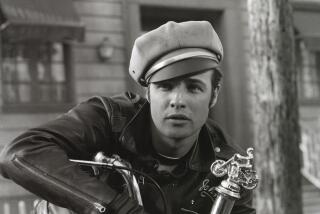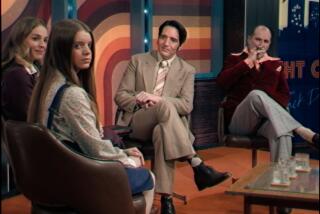Book review: ‘Party Animals: A Hollywood Tale of Sex, Drugs, and Rock ‘n’ Roll Starring the Fabulous Allan Carr’
Hollywood’s always had a soft spot for the gooiest of cheese, so long as the end result is piles of cheddar. Witness the 1978 film adaptation of “Grease,” a piffle of bogus nostalgia that lit up the box office.
It was Allan Carr who cleared the path for “Grease,” scraping the grit from the hit musical before bringing it to the screen. The sanitized movie version was remade in the image of the producer’s 1950s upbringing in Highland Park, Ill. Except that Carr wasn’t cool, good-looking or straight.
“Grease,” however, served its purpose, giving Carr the kind of cachet he’d craved since he’d first arrived in Hollywood a decade earlier. He’d been a successful showbiz worker bee: managing Ann-Margret, marketing films such as “Tommy” and throwing the town’s most decadent parties during the 1970s — arguably the century’s most decadent decade.
Still, if Carr had already been living like a figure in a Busby Berkeley musical, 1970s style — replete with throbbing disco beats, flashing lights, mountains of cocaine and handsome young boys for window dressing — “Grease” gave him real clout. Except that clout wasn’t necessarily a great thing for a man “who glittered in gold and measured less than an inch in depth,” notes Robert Hofler in the deliciously dishy “Party Animals: A Hollywood Tale of Sex, Drugs, and Rock ‘n’ Roll Starring the Fabulous Allan Carr.”
Hofler, a longtime entertainment journalist, gleefully recounts the decadence that swirled like puffy white clouds around Carr’s life and career. He was a boorish, obese man — “his body like jelly in aspic,” writes Hofler — and self-conscious about his appearance.
To compensate, he lived large, often larger than life. Hofler tells his story like a catty fly on a wall, a very good choice. But he also gives the man his due: While Carr was mesmerized by celebrity, he was a savvy showman who made great strides toward bringing a gay aesthetic to mainstream entertainment.
Perhaps his most notable achievement was helping to produce “La Cage aux Folles” on Broadway, although this wasn’t accomplished without a struggle. Carr could be a diva, and his fellow “La Cage” producers, Harvey Fierstein among them, called him “Flo” (short for “menstrual flow”) behind his back.
But the hit musical was nothing short of revolutionary, according to Hofler. “Allan was selling drag queens and, by extension, himself as a caftan-wearing man.”
If “La Cage” was a step forward, it was negated by a series of Hollywood misfires.
“Grease 2” and “Where the Boys Are” were merely bad; 1980’s misbegotten Village People-vehicle “Can’t Stop the Music” remains among the worst major motion pictures of all time.
Carr had fun, though, while it lasted, and Hofler offers salacious insight into Carr’s modus operandi.
Soliciting young hustlers with designs on Hollywood, he offered “cash or career.” Those hustlers were always on parade at Carr’s Benedict Canyon home, a glamour pit formerly occupied by Ingrid Bergman, Kim Novak and James Caan.
He called his home Hillhaven Lodge, and the residence was easily his greatest production. Hofler describes the décor as “disco by way of Louis XIV.” Celebrity photos adorned the walls, and one room — decorated like a movie set in pink and beige — was named after “Grease” star Olivia Newton-John.
In 1978, he hosted his infamous “Rolodex” party, which included an appearance by Roman Polanski, who had recently been arrested in a statutory rape case. As an exaggerated show of Hollywood solidarity, Carr led his guests in a standing ovation for the director.
Yet the industry wouldn’t be so forgiving when Carr experienced his own fall from grace after producing the 1988 Academy Awards. Carr wanted to make the show fun again. Instead, it was deemed the worst in Oscar history, starting with Rob Lowe’s impassioned opening duet with Snow White.
The industry believed Carr’s production was demeaning and publicly hung the producer out to dry until his death in 1999.
Hofler’s unflinching portrayal of Carr — petty, obnoxious, swimming in decadence — makes him a difficult character with whom to sympathize. But the venom with which Hollywood turned on Carr tips the scales. “If life isn’t fair, it’s downright berserk in Hollywood, where a couple of ill-placed fiascos can not only negate one’s success but also define one’s life,” Hofler writes.
“Party Animals” is an amazing ride through an era dripping with self-indulgence, a gaudy antidote to the likes of Peter Biskind’s “Easy Riders, Raging Bulls.”
But underneath the excess is the story of a lonely man who orchestrated his life like a Hollywood movie yet wasn’t allowed a grand finale. Allan Carr wanted to be Tyrone Power, but he ended up as Norma Desmond.
Himmelsbach is a Los Angeles writer and producer.
More to Read
The biggest entertainment stories
Get our big stories about Hollywood, film, television, music, arts, culture and more right in your inbox as soon as they publish.
You may occasionally receive promotional content from the Los Angeles Times.






